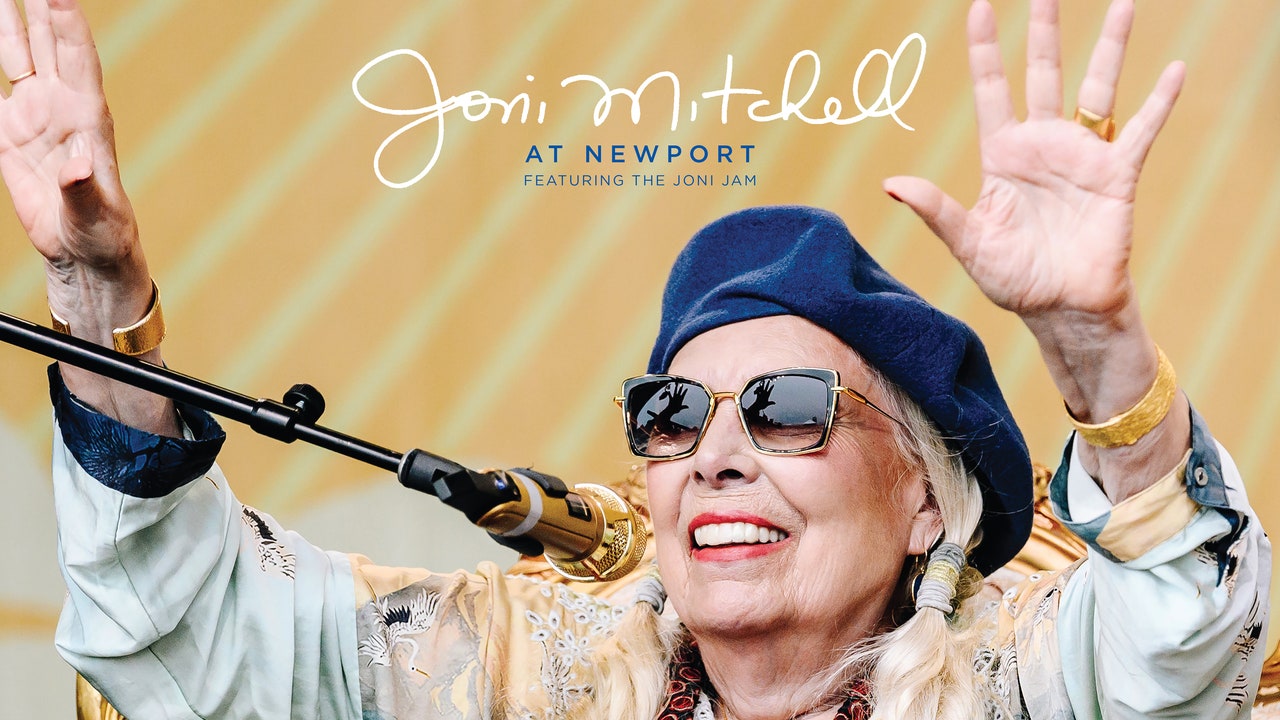Joni Mitchell’s unannounced set at the Newport Folk Festival late last July was pure social media manna. Just minutes after the most sophisticated singer-songwriter ever associated with “folk-rock” returned to the stage for her first full show in nearly a quarter-century, shaky videos and sunlit photos flooded sleepy Sunday timelines. There was Mitchell, 78, on a stage again, bejeweled and beaming, as if laughing at life’s absurd odds. It felt impossible not to consume every clip, the sacrament of some new miracle.
After surviving childhood polio, devastating post-polio syndrome in the ’90s, and a 2015 brain aneurysm, Mitchell had learned to sing and play some guitar again through a series of loose living-room hootenannies in her Southern California home. Her younger friends dubbed them “Joni Jams.” And now, with a dozen or so of those apostles, she had brought that party to a blazing but joyous Sunday afternoon in seaside Rhode Island. Her appearance was our world’s truly rarest commodity—a complete surprise, thrilling and affirming because it so long seemed impossible.
For all that day’s rapture and wonder, Mitchell’s unexpected appearance never really seemed the setting for a proper live album. (And she has made two, both staggering.) Consider how high passions were onstage, after all, with the acolytes—Brandi Carlile, Blake Mills, Lucius, Allison Russell, Marcus Mumford, and so on—there to assist in Mitchell’s resurrection as her sprawling, spirited band. On most of the songs, the kids took the lead, Mitchell supplying backup for her own songs; on occasion, she took charge, while they offered awestruck accompaniment. You can hear, appreciate, and even admire their ecstasy during At Newport, the hour-long edit of Mitchell’s day in the sun. It’s audible in the onstage squeals after she sings the second half of “A Case of You” or when Dawes’ Taylor Goldsmith stammers “That’s my hero right there” like some smitten schoolboy after he leads “Amelia.”
Such unrestrained fervor, though, makes for an album so frustrating that it actually complicates that memory’s innocent delight. Mitchell’s voice is gorgeous and rich throughout, a piece of high-pile cotton velvet warmed in the daylight. She renders “Both Sides Now” with the wisdom of survival, the “up and down” having still somehow delivered her here. But too often, her patient approach is swallowed by the tide of well-intentioned boosters, associates who make Mitchell feel like little more than an honorary guest at her own party.
Carlile’s role in helping Mitchell return to stage cannot be overstated. During a single decade, she went from a stylistic disciple to the advocate who covered Blue in full to one of the few true believers who held out hope Mitchell might still make music. Mitchell, in turn, used the star-studded and ultimately empowering private Joni Jams that Carlile facilitated as a Jacob’s ladder, unsteadily climbing toward an updated version of her singular voice. “Just watch… Joni’s back,” Mills remembered Carlile telling him after Mitchell sang several songs during a Joni Jam in September 2021. “[Brandi] recognized that moment,” Mills later said in a Mojo interview, “and she could see the future.”


